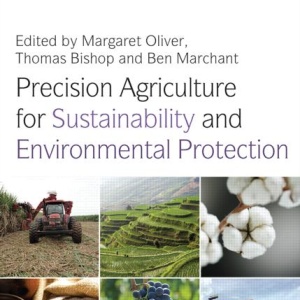The focus of this book is to introduce a non-specialist audience to the role of precision agriculture (PA) in food security, environmental protection, and sustainable use of natural resources, as well as its economic benefits.
Introducing the topic, they descibe how precision agriculture (PA) involves the application of technologies and agronomic principles to manage spatial and temporal variation associated with all aspects of agricultural production in order to improve crop performance and environmental quality. They also demonstrate the potential impact of PA on the environment and economy in terms of maximinsing both food production and resource efficiency.
The range of topics described includes sampling and mapping, weed and pest control, proximal and remote sensing, spatio-temporal analysis for improving management, management zones and water management. These are illustrated with case studies on sampling and mapping, biofuels from sugar cane and maize, paddy rice cultivation, and cotton production.
Citation as follows
Oliver, M., Bishop, T., Marchant, B., 2013, Precision Agriculture for Sustainability and Environmental Protection. Routledge
For more information see here.








Post a new comment »